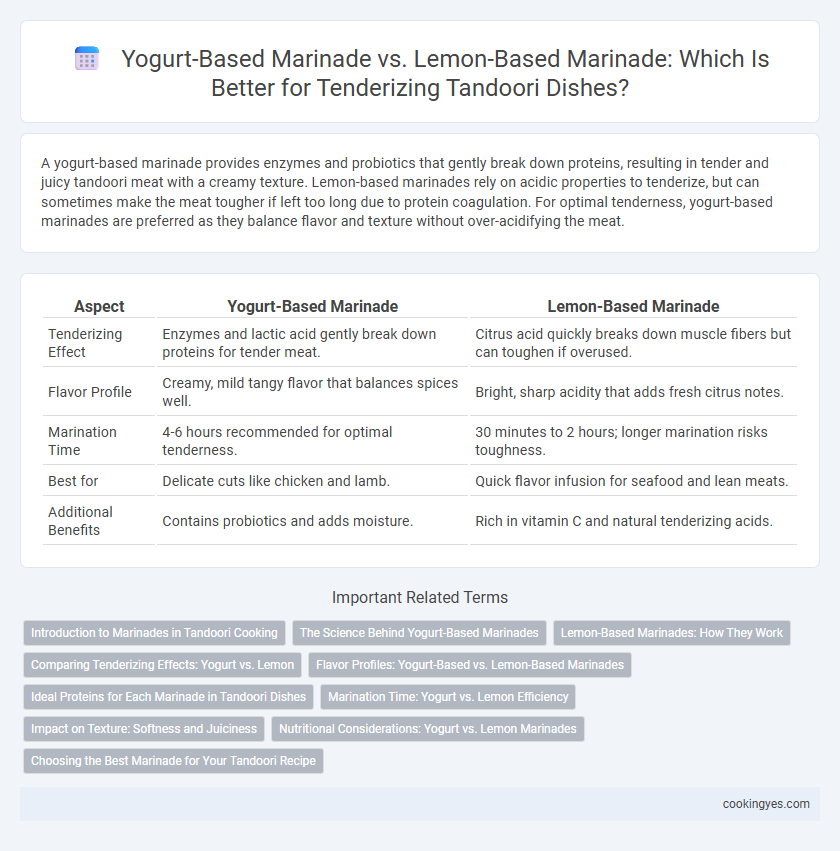A yogurt-based marinade provides enzymes and probiotics that gently break down proteins, resulting in tender and juicy tandoori meat with a creamy texture. Lemon-based marinades rely on acidic properties to tenderize, but can sometimes make the meat tougher if left too long due to protein coagulation. For optimal tenderness, yogurt-based marinades are preferred as they balance flavor and texture without over-acidifying the meat.
Table of Comparison
| Aspect | Yogurt-Based Marinade | Lemon-Based Marinade |
|---|---|---|
| Tenderizing Effect | Enzymes and lactic acid gently break down proteins for tender meat. | Citrus acid quickly breaks down muscle fibers but can toughen if overused. |
| Flavor Profile | Creamy, mild tangy flavor that balances spices well. | Bright, sharp acidity that adds fresh citrus notes. |
| Marination Time | 4-6 hours recommended for optimal tenderness. | 30 minutes to 2 hours; longer marination risks toughness. |
| Best for | Delicate cuts like chicken and lamb. | Quick flavor infusion for seafood and lean meats. |
| Additional Benefits | Contains probiotics and adds moisture. | Rich in vitamin C and natural tenderizing acids. |
Introduction to Marinades in Tandoori Cooking
Yogurt-based marinades in Tandoori cooking leverage lactic acid and enzymes to tenderize meat, enhancing moisture retention and developing rich, creamy flavors. Lemon-based marinades rely on citric acid to break down proteins, imparting a bright, tangy taste while slightly firming the meat's texture. Both marinades play essential roles in achieving the characteristic tenderness and complex flavor profiles of Tandoori dishes.
The Science Behind Yogurt-Based Marinades
Yogurt-based marinades leverage lactic acid and enzymes like proteases to break down proteins in meat, resulting in enhanced tenderness and juiciness. The probiotics in yogurt promote a controlled enzymatic reaction that softens muscle fibers without over-tenderizing, preserving the meat's texture. This scientific interaction contrasts with lemon-based marinades, where high citric acid can denature proteins more aggressively, sometimes leading to a mushy texture.
Lemon-Based Marinades: How They Work
Lemon-based marinades tenderize meat through their high citric acid content, which breaks down protein fibers and connective tissues, resulting in a softer texture. The acidity also helps enhance flavor absorption, intensifying the overall taste of Tandoori dishes. Compared to yogurt-based marinades, lemon-based options act faster but require careful timing to prevent over-tenderizing and mushiness.
Comparing Tenderizing Effects: Yogurt vs. Lemon
Yogurt-based marinades tenderize tandoori dishes by utilizing lactic acid and enzymes that gently break down proteins without toughening the meat, resulting in a moist and flavorful texture. Lemon-based marinades rely on citric acid, which can denature proteins more aggressively, potentially leading to a firmer or rubbery texture if marinated too long. Choosing yogurt over lemon for tenderizing enhances juiciness and tenderness in tandoori preparations due to its balanced acidity and enzymatic properties.
Flavor Profiles: Yogurt-Based vs. Lemon-Based Marinades
Yogurt-based marinades for tandoori dishes create a rich, creamy texture and impart a tangy, mildly acidic flavor that tenderizes meat by breaking down proteins gently, preserving moisture. Lemon-based marinades deliver a bright, citrusy zing with a sharper acidity that aggressively tenderizes meat but can sometimes lead to a firmer texture if overused. The choice between yogurt and lemon influences both the mouthfeel and depth of flavor, with yogurt providing a smooth balance and lemon adding vibrant, crisp notes.
Ideal Proteins for Each Marinade in Tandoori Dishes
Yogurt-based marinades in Tandoori dishes are ideal for tenderizing proteins like chicken, lamb, and paneer due to the lactic acid and enzymes that break down muscle fibers gently while enhancing flavor. Lemon-based marinades suit firmer proteins such as fish and shrimp, where citric acid acts quickly to tenderize without overpowering the delicate texture. Each marinade type optimizes the protein's texture and taste, with yogurt providing creamy richness and lemon imparting bright acidity.
Marination Time: Yogurt vs. Lemon Efficiency
Yogurt-based marinades tenderize meat more efficiently during extended marination times, typically requiring 4 to 6 hours to break down proteins gently without causing toughness. Lemon-based marinades act faster due to their high acidity, often needing only 30 minutes to 1 hour, but prolonged exposure can lead to over-tenderizing and a mushy texture. Choosing between yogurt and lemon for marination depends on the desired texture and available time, with yogurt preferred for slow, consistent tenderizing and lemon suited for quick flavor infusion.
Impact on Texture: Softness and Juiciness
Yogurt-based marinade enhances tandoori chicken by breaking down proteins with lactic acid, resulting in a tender, juicy texture that retains moisture during cooking. Lemon-based marinade, rich in citric acid, tenderizes meat through protein denaturation but can sometimes lead to a firmer texture if left too long. The creamy consistency of yogurt also creates a protective coating, helping preserve softness and juiciness, while lemon marinade offers a brighter flavor but with potential dryness if overused.
Nutritional Considerations: Yogurt vs. Lemon Marinades
Yogurt-based marinades offer probiotic benefits and provide essential nutrients such as calcium and protein, helping enhance the overall nutritional profile of tandoori dishes. Lemon-based marinades are rich in vitamin C and antioxidants, supporting immune function while adding a fresh, tangy flavor. Choosing between yogurt and lemon marinades can impact the nutritional value through varied vitamin, mineral, and probiotic content in tandoori preparations.
Choosing the Best Marinade for Your Tandoori Recipe
Yogurt-based marinades excel in tenderizing tandoori dishes by breaking down proteins gently with lactic acid and enzymes, resulting in a succulent texture and enhanced flavor absorption. Lemon-based marinades provide a sharper acidity that can tenderize quickly but may toughen meat if overused due to stronger citric acid content. For optimal tenderness and balanced taste, yogurt-based marinades are preferred in traditional tandoori recipes, ensuring moistness and richness while maintaining the dish's authentic spices.
Yogurt-based marinade vs Lemon-based marinade for tenderizing Infographic

 cookingyes.com
cookingyes.com